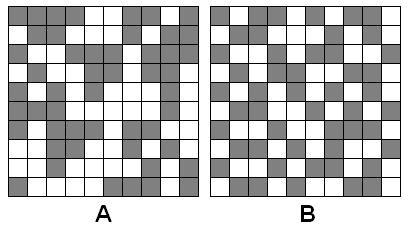Some bad assumptions are being made. For a start a pRNG
is not a random number generator. It uses an algorithm to generate a string of numbers that appear to be random, but have an underlying predictability. The 'randomess' of this is increased IIRC by using a number seeded from the CPU's clock timer (which is why saves produce different results on different computers, despite a preserved seed. I may be a bit behind the times though

)
Brain. Nice diagrams. How did you produce them? If A was produced by rolling a dice or tossing a coin, then it is random. Otherwise it used a pRNG and cannot truly be described as random. How did you produce B? Sure it looks suspicious, because there is a greater frequency of changes from Grey to White than would be expected from a random distribution, but you must have used some sort of algorithm to produce it, or you could not say that it is not random, hence you must have used a pRNG. I would guess that you used algorithms to produce both results (how else would you get perfect 50/50 grey/white distribution). The fact that they appear different shows that one is better than the other at mimicking true randomness. In actual fact they can both be considered random, looking at them, but one has a higher Fractal Dimension than the other.
When people complain about the RNG producing long strings of wins or defeats they do not neccessarily mean that it is not producing a good approximation of randomness, just that it
looks unfair, and they would prefer the pseudo-randomness of Brain's diagram B, to that of A.
If you roll a pair of dice 10,000 times the 'laws of probability' in no way state that you should get an average roll of 7. But if you keep a record of the totals for each roll, I would be surprised if you didn't get a lovely bell shaped curve on a histogram. With 7 the most frequent result. I would be
amazed if the average
was 7.



 )
)